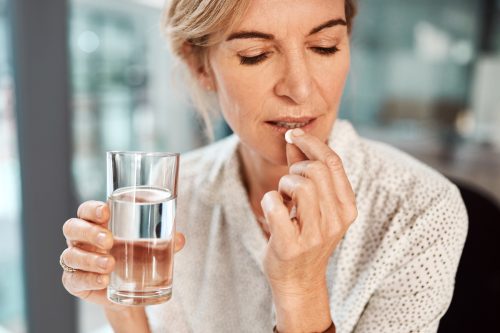Doctors Reveal 6 Surprising Benefits of Taking a Biotin Supplement — Best Life
Biotin, also known as vitamin H or B7, is a water-soluble nutrient that helps turn food into energy. It can be found in salmon, eggs, nuts, soybeans, bananas, liver, mushrooms, pork chops, sweet potatoes, and more. It’s an important vitamin because it helps metabolize fats, carbohydrates, and amino acids, the building blocks of protein, which are vital for repairing the body. For this reason, the health benefits of biotin are more diverse than you may realize, doctors say, which is why some people turn to biotin supplements.
RELATED: 8 Surprising Vitamin D Side Effects, According to Doctors.

 Shutterstock
Shutterstock
Since biotin is found in a variety of foods, it’s rare to have a deficiency, especially with a well-balanced diet; however, certain long-term conditions like Crohn’s disease make it hard to absorb nutrients, as does taking antiseizure medication or antibiotics for an extended period of time. Symptoms of a deficiency include changes in skin, hair, and nails, cracking in the mouth, rashes, dry eyes, fatigue, and loss of appetite.
In those cases, some people take a biotin supplement, but doctors advise speaking with your physician beforehand.
“Vitamins should be started after discussing them with your health care professionals, as taking vitamins on their own or in the presence of other health conditions might exacerbate health conditions or uncover new conditions,” says Tomi Mitchell, MD, a board-certified family physician with Holistic Wellness Strategies.
However, with your doctor’s approval, you may stand to benefit from the following biotin benefits.
RELATED: 5 Supplements That Can Damage Your Kidneys, Doctors Say.

 aijiro / Shutterstock
aijiro / Shutterstock
Eating a healthy diet loaded with protein, healthy fats, vitamins A, E, and D, iron, and carbohydrates is especially important for shiny, thick hair and strong nails.
If you’re not getting enough nutrients, you may be tempted to spend big bucks on pricey shampoos and oils, hoping for a quick fix. However, many believe biotin is a game-changer for improving brittle nails and hair thickness because it “promotes the production of natural oils in the scalp, which keeps hair healthy,” notes Mitchell.
However, according to Cleveland Clinic, the research is not definitive as to whether or not biotin helps with hair growth, though it is used to help treat the hair-loss condition alopecia.
“In addition, there are plenty of shampoos made with biotin, and they can help with hair follicle regeneration,” Best Life previously noted.

 iStock
iStock
Worldwide, 830 million people battle diabetes, according to the World Health Organization (WHO). Heart disease, blindness, kidney failure, and more health issues can happen if diabetes is not managed, and it’s currently the eighth leading cause of death.
There are many types of diabetes, but those with type 1, a condition where the pancreas doesn’t make enough insulin, could see relief from biotin, as it might help reduce blood sugar levels.
“A small study involved people with type 1 diabetes, aged 5 to 25, with poorly controlled blood sugar,” Mitchell explains. “Participants took 40 mcg of biotin daily alongside insulin or just used insulin. After three months, the biotin group showed lower blood sugar levels than those who did not supplement with biotin, indicating a potential benefit of biotin in managing diabetes.”
Biotin could also help people with type 2 diabetes, when the body cannot process sugar properly in the bloodstream, for its potential to lower blood sugar and reduce high cholesterol.
“A large 2022 meta-analysis… found that biotin supplementation may lower total cholesterol and cholesterol levels among people with type 2 diabetes, who are at higher risk of heart disease,” says Samantha Cassetty, MS, RD, nutrition and wellness expert and co-author of Sugar Shock.
RELATED: 21 Surprising Signs You Have a Vitamin Deficiency.

 iStock
iStock
Proper prenatal care can help identify early problems and ensure a smooth delivery. Eating a balanced diet packed with vitamins and nutrients, including biotin, is also vital during pregnancy, as it’s important for embryonic growth.
“Biotin is getting more attention for prenatal care,” shares Bess Berger, RDN, CDN, founder of Nutrition by Bess. “Some studies show that one-third of pregnant women are low in biotin. While sources are unclear as to why this is, supplementing with biotin may be beneficial in the meantime.”
Before taking biotin during pregnancy, consult with your physician.

 iStock
iStock
A study published last year in the journal JAMA Network Open explored the connection between gut health and Parkinson’s. The researchers found that people with upper gastrointestinal mucosal damage had a 76 percent higher chance of developing the disease, Best Life reported at the time.
A separate study published in the journal npj Parkinson’s Disease concluded that biotin deficiency was common in Parkinson’s patients, likely because the vitamin has anti-inflammatory properties, especially as it pertains to the gut.
RELATED: 3 Supplements I Would Never Take as a Pharmacist: “I Think You’re Going to Be Surprised.”

 iStock
iStock
Dialysis is a lifesaving treatment for people with kidney failure that entails helping the body remove waste and fluids from the blood when the kidneys are too weak and unable to do so. Muscle cramping is a common side effect of the treatment due to fluid loss. To help ease the discomfort, some patients take biotin supplements.
Mitchell points to a 2012 study that found taking 1 mg of biotin daily significantly reduced cramping during and after dialysis for the majority of participants.

 iStock
iStock
Multiple sclerosis (MS) is an incurable chronic central nervous system disorder that damages the protective myelin sheath surrounding nerve fibers in the brain, spinal cord, and eyes. MS affects everyone differently. Some people only experience mild symptoms, while others may lose the ability to see, write, speak, or walk.
However, taking a biotin supplement may help with MS-associated fatigue and pain.
“This supplementation shows potential in reversing disease progression and alleviating chronic disability, presenting a promising adjunct treatment for MS,” says Mitchell. “Research indicates that individuals with MS respond positively to daily biotin doses of up to 300 mg.”
Cassetty also points to clinical trials that she says are “the gold standard of research,” which show nearly 900 people with MS benefited from a high-dose biotin supplement.
However, she warns that “high-dose biotin supplements can interfere with certain lab tests, and so far, studies have been mixed, so I wouldn’t run out to the supplement aisle without speaking to your doctor first.”
That advice is true for anyone considering taking a new supplement: Always speak with your healthcare provider first to be sure you’re avoiding potential interactions between other supplements and medications.
This story has been updated to include additional entries, fact-checking, and copy-editing.
We offer the most up-to-date information from top experts, new research, and health agencies, but our content is not meant to be a substitute for professional guidance. When it comes to the medication you're taking or any other health questions you have, always consult your healthcare provider directly.